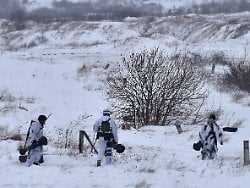Powder keg Ukraine conflict
Anti-nuclear weapons initiative warns of escalation
01/28/2022, 3:40 p.m
The increasing tensions between the two nuclear powers USA and Russia alarmed the international campaign to abolish nuclear weapons. If the conflict escalates, the nuclear weapons stationed across Europe could quickly become “targets”.
The International Campaign to Abolish Nuclear Weapons (ICAN), which won the Nobel Peace Prize, has warned of an escalation in the Ukraine conflict. “Any conflict involving one or more nuclear-armed states is extremely dangerous,” said ICAN boss Beatrice Fihn. A reduction in tensions between the nuclear powers USA and Russia is urgently needed. “This is not the time for warmongering and macho threats, but rather for sitting down and negotiating.”
In a “very hectic security environment, things can escalate very, very quickly,” Fihn warned. She expressed particular concern about “the nuclear weapons stationed on the Russian border, but also across Europe.” In the event of a full-scale military conflict, these could become “targets,” said the Ican boss.
Concerned about the situation in Belarus
Fihn also stressed the need to promote nuclear disarmament in general to help de-escalate the conflict. “We have heard voices from Belarus talking about wanting to station Russian nuclear weapons there, which I think is an extremely dangerous situation,” she said.
Fihn called on Belarus, Ukraine and other countries to sign the multilateral treaty that came into effect last year, banning the use, development, production, testing, deployment, stockpiling and threat of use of nuclear weapons.
Moscow has massed tens of thousands of soldiers on the Ukrainian border in recent weeks. The West therefore fears a possible attack by Russia on the neighboring country. The Kremlin categorically denies this. At the same time, Moscow is demanding “security guarantees” from the US and NATO. Among other things, Russia is demanding that the military alliance should not expand further eastwards. However, in a response submitted on Wednesday, the United States and its NATO partners rejected this request.
